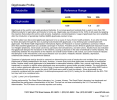Well, I read a book some months ago about balancing hormones and the recommendation is to eat a pound (2 cups) of cruciferous/sulfur veggies a day (cooked). So, I started doing that. And it sure has made a positive difference for me. I vary between broccoli, cauliflower, cabbage, and brussel sprouts all prepared in different ways. What I like best is a mix of broccoli and cauliflower pureed with lots of butter and a bit of garlic; it's better than mashed potatoes! The positive effect on my intestines, after an initial period of adjustment, has been nothing short of phenomenal.
Hi Laura, is there any chance you could share the title of the book and the author?
I read about the positive impact of cruciferous vegetables on the hormones in the past too, when I first started to look into my own health issues that doctors couldn't resolve. I normally do eat quite a lot of them, although it's certainly not 2 cups a day.
I started looking into this and I discovered that the ingredient found in cruciferous vegetables that helps the body balance hormones and remove excess estrogen is Diindolylmethane and it's available as a supplement.
More info:
Diindolylmethane Benefits
I took it for some time and although my periods did improve all other symptoms remained unchanged. I discontinued taking it because I came across information that cruciferous vegetables may reduce absorption of iodine. Since iodine was said to help with hormones too I figured I was better off giving it a proper try without possible interference. And I must say iodine has been amazing at improving many of my symptoms.
Unfortunately I wasn't able to find conclusive data on cruciferous vegetables and iodine absorption. Most articles don't provide links to research and if they do I don't have sufficient knowledge base to separate the wheat from the chaff. And there is plenty of contradicting data out there. Some examples:
The Truth About Cruciferous Vegetables and Your Thyroid
News Update: Can Kale Cause Hypothyroidism?
Role of dietary iodine and cruciferous vegetables in thyroid cancer: a countrywide case-control study in New Caledonia
Why Is Broccoli Bad For Thyroid?
There's one thing that caught my attention in the Methylene Blue thread:
However, there is one very, VERY odd thing. Among the many tests I did at the Belgrade clinic was metals and minerals thing. You won't believe it but my iodine was critically LOW! AND, my zinc was critically high! And, despite the fact that I've done numerous rounds of DMSA and EDTA, my mercury was also high.
I don't have an explanation for this considering how long and how much I loaded iodine and continue to take it off and on. However, I did wonder if the MB had anything to do with these results?
I may be building connections where there aren't any but it did make me wonder if the cruciferous vegetables could have caused poor absorption of iodine? That post was written almost a year ago so the situation might have changed of course.
Since my diet is super high in sulphur and my health isn't exactly fantastic I thought I'd give the approach in the opening article a try. It's only a two-week protocol and I'm half way through it so I figured it won't hurt to try. Although the supplements added up to £80 I will have saved that money on food. I will give it full 2 weeks before reporting on any results.
My issue is that symptoms that used to be consistent now come and go - and I just can't work out what brings them back. It's 70% feeling great and 30% feeling 'meh' so I'm really grateful for all the advice on the forum that got me to this point. These days I can have a very good week followed by fatigue and brain fog that seems to come out of nowhere. Sometimes I wake up with or without it. Other times I can literally feel it kick in - or go away. Strange stuff.
My diet and lifestyle are boringly consistent and I don't experiment much out of fear of another bout of fatigue (among other symptoms). Well, this potentially means that the low sulphur diet won't be a success either: there are periods when I feel very well and I consistently eat high sulphur foods.
Honestly, trying to solve the puzzle of my health out is like getting a Parkinson's sufferer to solve the Rubik's cube with their hands behind their back - while their trousers are on fire.

I'm sorry for the descriptive expression but "difficult and confusing" doesn't seem to convey the level of challenge.


 I'm sorry for the descriptive expression but "difficult and confusing" doesn't seem to convey the level of challenge.
I'm sorry for the descriptive expression but "difficult and confusing" doesn't seem to convey the level of challenge. 
